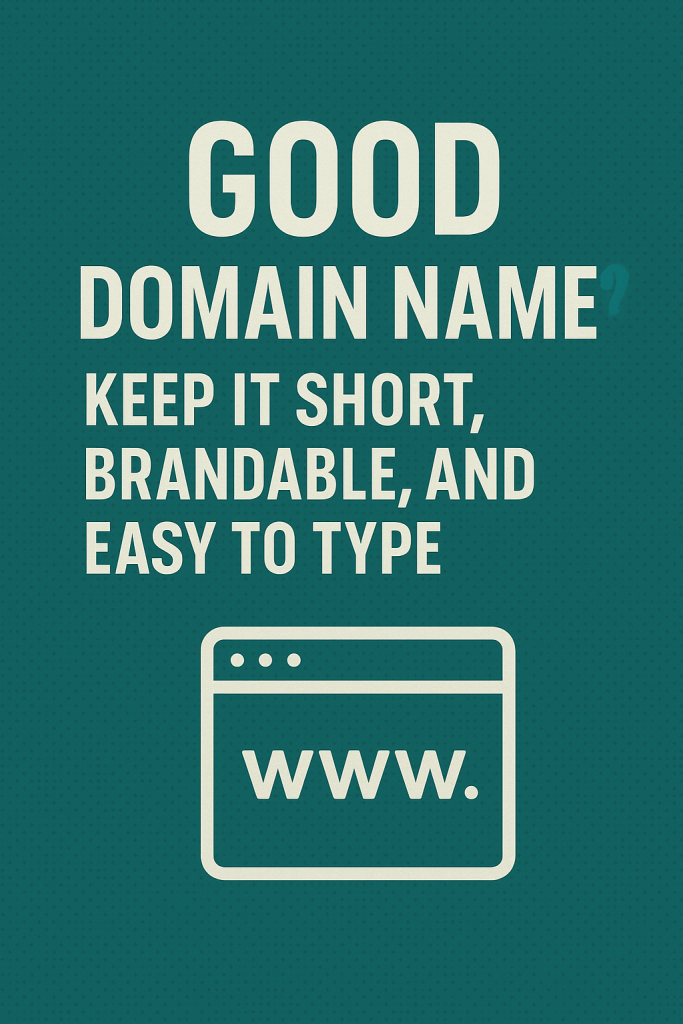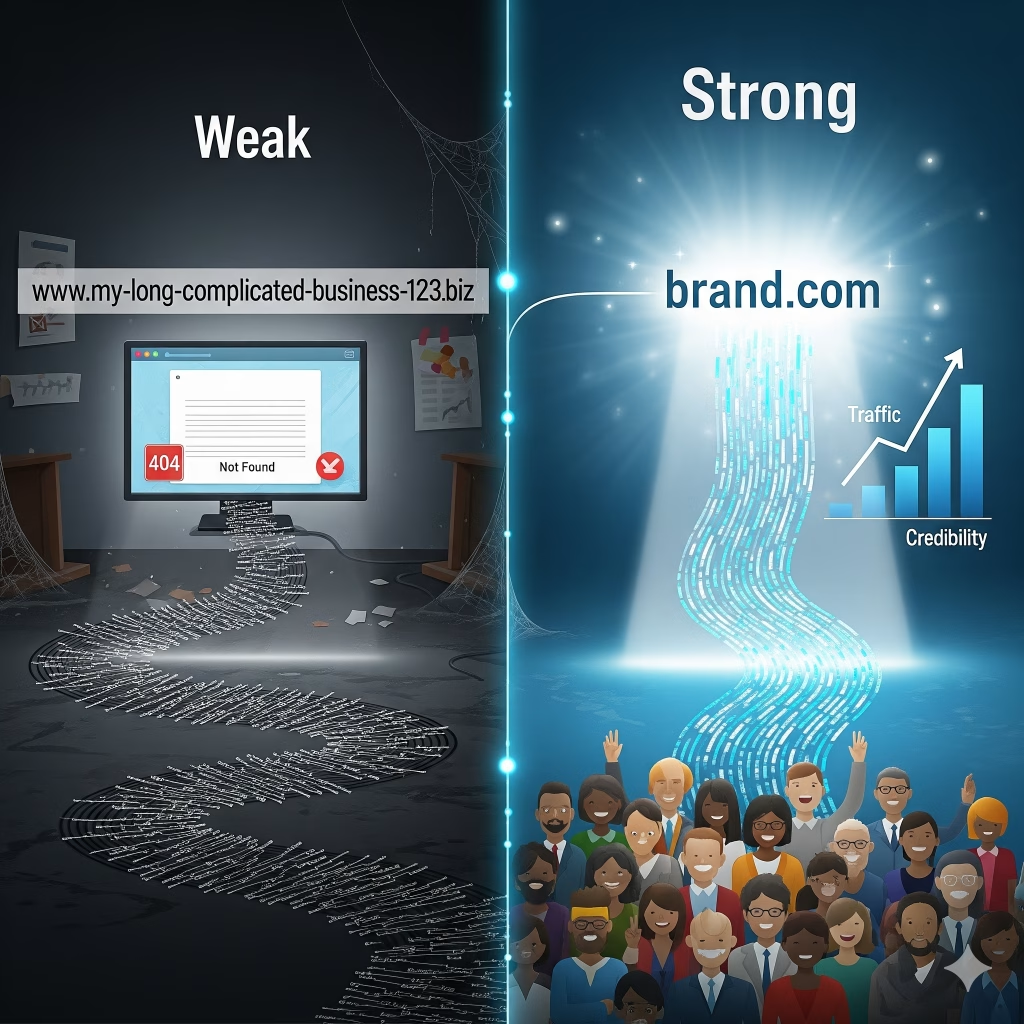
🔹 Buy common misspellings (e.g., Flicker.com if you own Flickr.com).
🔹 Secure social handles (check Namechk.com for consistency).
🔹 Renew annually to avoid losing your domain.
Need help brainstorming? Share your business name/niche, and we’ll suggest domain ideas! 😊
1. Keep It Simple & Memorable
✅ Short (1-3 words max) – e.g., Google.com, Etsy.com
✅ Easy to Spell & Pronounce – Avoid hyphens, numbers, or weird spellings (“Xpress” vs. “Express”).
✅ Brandable – Unique, not generic (e.g., Spotify.com > MusicStreaming.com).
2. Match Your Brand
- Ideal: Use your business name (e.g., YourBusinessName.com).
- Alternative: Add a keyword if the exact name is taken (e.g., TastyBakeryNY.com).
3. Use the Right Extension
- Best choice: .com (most trusted and easy to remember).
- Alternatives:
- .net (tech), .org (nonprofits), .co (startups).
- Location-based: .uk, .ca, .au (if targeting a specific country).
4. Avoid Legal Issues
- Trademark check: Use USPTO.gov or Trademarkia to avoid conflicts.
- Domain history: Check if it was previously penalized (use Wayback Machine).
5. SEO-Friendly (Optional but Helpful)
- Include a keyword if it fits naturally (e.g., BestRunningShoes.com).
- Avoid stuffing (e.g., CheapFastGoodPizza.com looks spammy).
6. Check Availability & Buy
- Search tools: Use Namecheap, Google Domains, or GoDaddy.
- Act fast: Good domains sell quickly!
Examples of Good vs. Bad Domain Names
| Good | Bad |
|---|---|
| Trello.com | ProjectManagementApp123.com |
| AllBirds.com | ShoesForYouOnline.net |
| Canva.com | *Design-Tools-4U.com* |
Beyond registration, think strategically about long-term domain management. Enable auto-renewal to prevent accidental expiration, and use domain-locking to protect against unauthorized transfers. Incorporate WHOIS privacy protection to shield your personal or business contact details from public exposure—this helps reduce spam and protects your brand from impersonation or spoofing. Additionally, keep DNS records properly configured (e.g. A records, MX records) for email and hosting, and regularly monitor uptime and SSL certificate status to maintain trust and performance. Platforms like DNSimple or Cloudflare offer streamlined tools for DNS, SSL, forwarding, and security management, simplifying long-term administration for businesses of all sizes.
Ultimately, a well-chosen domain is more than just an address it becomes a core pillar of your online brand identity, anchoring your website, email communication, marketing collateral, and customer recall. The right domain fosters trust, reinforces brand cohesion, and supports search visibility over time. Many brands that invested early in memorable, evergreen domains later report that their URL became an integral, even appreciated, asset improving open rates, direct traffic, and brand equity. Wemaxa guides every client through each step, from ideation and availability checks to registration and long-term governance, ensuring that your domain contributes meaningfully to your digital brand strategy rather than acting as an afterthought.
MORE LINKS:
What is web design?
Responsive website?
Do I need a website?
How long design takes?
Design vs development?
Website redesign
Mobile friendly?
Template vs custom
How much it costs?
HOW TO CHOOSE A GOOD DOMAIN NAME?
Choosing the right domain name is one of the most important steps when building your online presence. Your domain is the address where people find you online, and it directly impacts branding, search engine optimization (SEO), and trust. A strong domain name is easy to remember, represents your brand clearly, and gives your project or business a professional edge.
Why a Domain Name Matters
Your domain name acts as the foundation of your digital identity. It shapes first impressions, supports your marketing, and helps you stand out in a crowded space. Research shows that short, memorable domains are more likely to be typed correctly, shared on social media, and remembered long term.
- A confusing or complex domain may turn away potential visitors.
- A clear and relevant domain can improve click-through rates and brand credibility.
For a deeper explanation of how domains work, see Domain Name on Wikipedia.

Tips for Choosing a Strong Domain Name
1. Keep It Short and Simple
Short domains are easier to type, remember, and share. Ideally, stick to 6 to 14 characters. Avoid unnecessary words, complex spellings, or repeated letters.
2. Use Keywords When Possible
Keywords in your domain can help SEO. For example, a local bakery might choose bestbakerynyc.com. However, avoid keyword stuffing keep it natural. Google’s own guide on SEO best practices emphasizes readability and branding over forced keyword use.
3. Choose the Right Extension
.com is the most trusted and widely used domain extension, but alternatives like .net, .org, or newer options such as .io and .tech can work depending on your niche. A discussion on Reddit Entrepreneur often highlights how startups creatively use new extensions.
4. Make It Easy to Pronounce and Spell
Word-of-mouth marketing matters. If people can’t say or spell your domain easily, they might not remember it. Avoid hyphens and numbers whenever possible.
5. Check Availability and Trademarks
Always check if your domain is available and not infringing on trademarks. You can search availability using a registrar like Google Domains or Namecheap. For trademark conflicts, consult the United States Patent and Trademark Office database or your local authority.
Common Mistakes to Avoid
- Choosing a domain that’s too long or complicated.
- Using special characters like hyphens or numbers unnecessarily.
- Copying another brand’s domain name too closely.
Choosing a good domain name is crucial for branding, SEO, and user trust. It’s often the first impression people get of your business, so it needs to be memorable, relevant, and easy to type. A strong domain name reinforces your brand identity and helps visitors recall your website without having to search for it repeatedly. Think of it as your online address clean, consistent, and instantly recognizable.
From an SEO perspective, your domain can also play a role in visibility. While exact match domains are no longer necessary, including a relevant keyword or industry term can give context to search engines and users alike. More importantly, a domain that clearly reflects your business or service builds immediate trust. Avoid confusing spellings, long strings of words, or anything that looks spammy or generic.
User experience is another key factor. A domain name should be easy to pronounce, easy to share verbally, and free from hyphens, numbers, or uncommon characters that could cause confusion. Shorter names tend to perform better, but clarity is always more important than brevity. If your domain is simple, intuitive, and closely aligned with your brand, users are far more likely to engage and return.
At Wemaxa.com, we help clients choose strategic domain names that support their long-term goals. Whether you’re launching a new brand or rebranding an existing one, the right domain name sets the tone for everything that follows from design and marketing to search visibility and credibility.
How Do I Choose a Good Domain Name?
Choosing the right domain name is one of the most strategic decisions you can make when launching or repositioning your website, because it influences branding, search engine visibility, credibility, user recall, and even long-term digital asset value. A well-chosen domain contributes meaningfully to first impressions visitors frequently form judgments about your professionalism and trustworthiness within seconds of seeing your URL. Aspects to weigh include length (ideally under 15 characters), memorability, relevance to your brand or industry, spelling simplicity (to reduce typos), and extension (.com remains top-tier, though industry-specific TLDs such as .tech, .shop, or .agency may be appropriate depending on your niche). For informed guidance on domain psychology and naming trends, platforms such as Moz offer comprehensive studies linking naming strategies to SEO and legitimacy, while case studies from Shopify illustrate how established brands selected memorable domain names and the impact it had on brand equity and search rankings.
When brainstorming domain options, balance creativity with clarity. Avoid using hyphens or confusing abbreviations that make vocal communication awkward or invite mis-typed entries. Instead, prioritize a domain that clearly represents your brand, product line, or purpose. Including primary keywords in your domain such as “bikes,” “lawyer,” “digital,” or “consulting” can provide subtle SEO benefits and help users quickly understand what your site offers. That said, domains should remain concise to allow for easy recall and typing. For granular domain-naming strategies and keyword guidance, refer to resources such as Ahrefs and Backlinko, which provide data-driven insights on click-through rates, memorability, and search performance associated with different naming approaches.
Once you have selected a shortlist of possible domains, take practical steps to secure the best one while protecting your brand. Conduct availability checks via domain registrars such as Namecheap or GoDaddy, and check that related social media handles are also available to maintain brand consistency across platforms. Consider purchasing variants such as .com, .net, .org, along with common misspellings, to prevent competitors or copycats from registering similar domains. If your desired domain name is unavailable at current market price, you can attempt to negotiate with the current owner or monitor aftermarket listings on platforms like Sedo or Afternic. Be cautious in these transactions and verify ownership through WHOIS data, ensuring that the transfer process is secure and documented. Research from domain marketplaces like DomainInvesting.com highlights how premium domains often command high prices based on shortness, memorability, and prior traffic.
Final Thoughts
Your domain name is more than just a web address, it’s your brand identity. Take the time to make it short, simple, and memorable while ensuring it aligns with your business goals. With the right domain, you set the foundation for long-term growth and recognition online.


